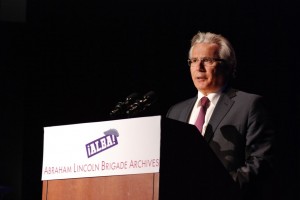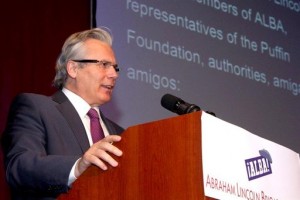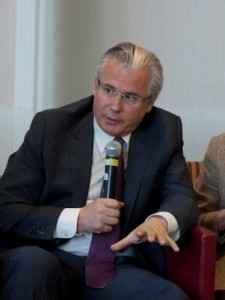Garzón: “Continue the fight for human rights, for human dignity, and against impunity”
Editors’ Note: Judge Baltasar Garzón received the First ALBA/Puffin Award for Human Rights Activism in New York City, on May 14, 2011. This is his acceptance speech.
Veterans of the Abraham Lincoln Brigade, members of ALBA, representatives of the Puffin Foundation, authorities, amigas y amigos:
Seventy-five years ago in my country, Spain, one of the darkest and saddest chapters in the history of humanity began. It lasted more than forty years and even today, after 34 years of democracy, it has not been definitively read or closed, or as such, overcome. An unjust and illegal war, though perhaps all wars are, was begun in 1936 by those who scorned the freedom, legality and democracy of the Republic. It was done by those for whom the life of their equals held little value and who, by their decisions, launched a bloodbath between brothers and sisters, with tens of thousands of them tortured, disappeared, and executed without trial; thirty thousand children (known as the Lost Children of Francoism) were stolen from their families simply because their parents were supporters of the Republic, a crime that, according to the new regime, made them unfit to raise their own children.
But it was not just a civil war. The fascist regimes in Germany and Italy aided the rebels led by General Franco, while the western democracies stood by, silent and motionless. But International Solidarity soon stepped up. Forty thousand men and women from fifty-two countries, including twenty-eight hundred from the United States, forming the International Brigades to fight against fascism in Spain, offering their lives for an ideal.
The American Volunteers were known as the Abraham Lincoln Brigade. Among them were some seventy-five women, ninety African-Americans, and nearly thirty percent of them were Jewish. It was the first military unit in US history in which white soldiers served under the command of a black commander, Oliver Law. We know that nearly a third of them (nine-hundred) lie forever buried in the Spanish earth. The rest, on their return to the US were persecuted by the McCarthy Commission, which labeled them “Premature Antifascists.”
For me, as for so many others throughout the world, they are an example of courage and solidarity; they are heroes who chose to fight for the promise of freedom and democracy; whose convictions led them to offer the ultimate sacrifice and suffer purges in their own country; who took part in all the important social struggles of their day: from the Mississippi Freedom Summer to opposition to the Vietnam war, from US intervention in Central America in the eighties to the invasion of Iraq. They were the kind of people who fight against the worst cancer of humanity: indifference.
It is our duty to carry this idea of solidarity forward, as ALBA has done for the last 32 years, in the areas of culture, politics, and human rights activism, as the Puffin Foundation continues to do. I want to take this opportunity to salute Perry Rosenstein, president of the Puffin Foundation, who by establishing this Award fosters the creation of an informal network of allied organizations, all working on issues of human rights, historical memory, and the legacy of the International Brigades. The joining of forces of these two institutions—ALBA and the Puffin Foundation—is key to reactivating definitively the fight for truth, justice and reparation for the victims of so many wars and massacres that, today as in the past, scourge our world. Initiatives like this restore our belief in the possibility of regenerating the world.
With humility and gratitude I accept this award given to me today, for precisely today is the anniversary of my suspension from my position in the Spanish judicial system for trying to investigate the crimes of the Franco regime. That day I was surrounded by friends, and today I am too. Thank you for being here.
While I am not worthy of this honor, I would be lying if I did not recognize that it makes me extremely proud to receive it, for what it means for the commitment to the future of this passionate fight against impunity. I am just a judge who has always tried to comply strictly with the law in every case, with a universalist vision, integrated with the basic values that give sense and coherence to the International Community, beginning with respect for human dignity as the foundation that underlies the doctrines of Human Rights. I am one of many who struggle against the theory that the course of the history of the world can only be changed by the force of arms, for only by force, they tell us, can peace, security, and the world order be maintained.
Yet this is not true. To give up guarantees and turn to the powers that be and to the use of techniques that contradict the fundamental principles of the rule of law, is not only unacceptable legally, in the long run it also does more harm than good. Another way is possible. And that way must be led by Justice and the Rule of Law, to protect and defend the victims of war, terrorism, and mass crimes that have sown the earth with death and desolation.
All of us, my dear friends, have a moral and even legal obligation to fight against amnesia and indifference, just as we must fight against those who instigated or consented to barbaric acts. To do so means holding high the banner of dignity and human rights to shore up the crumbling edifice of the International Community, and finally turning away from the path of illegality and spaces where the rule of law does not exist, all in the name of the so-called war against terror. To do so means turning toward spaces of equality and the eradication of impunity. But impunity, which had been defeated, after decades of struggle, by the right to truth and the right to justice, which transform memory into one of the most genuine driving forces of the historical reconstruction of a people, has once more gained ground at the expense of justice in many countries, including Spain, which has gone from being a pioneer in the application of the principle of Universal Jurisdiction to cowering in the corner of cowardice, neither wanting nor able to confront its past or look at itself.

Judge Garzón delivers his acceptance speech after receiving the 2011 ALBA/Puffin Award for Human Rights Activism. Photo Len Tsou
Some two-hundred thousand men and women, murdered, executed without trial, tortured, disappeared, lie buried in roadside ditches, in fields, in cemeteries, unidentified, a source of shame for the Spanish people that is so proud of its Transition from dictatorship to democracy, in which, incidentally, any possible resolution of this became impossible.
What is the moral caliber of those who, admitting the necessity of investigating mass crimes in other countries, nonetheless refuse to do so in their own land?
Judges have the obligation to investigate those facts, no matter the personal or professional risks, in order to give a valid response to the human rights of the victims, which consists of the right to truth, to justice and to reparation. Justice, to fulfill its function, must create and consolidate the principle of universal victim as the nucleus of this new vision of an active Universal Jurisdiction in the pursuit of the perpetrators of crimes against humanity, above any particular political, economic or diplomatic interests that, for circumstantial reasons, seek to secure their impunity.
Kant’s concept of Justice based on respect for the human rights of any individual and of international justice exercised by independent tribunals such as the Inter American Court for Human Rights, the European Tribunal for Human Rights, or the International Criminal Court, are the best proof that this enterprise is feasible. Sixty-three years ago the Universal Declaration of Human Rights was signed as a clear project of international coexistence based on the respect for the guarantee of all the rights of all citizens of the world.
Today this declaration is still waiting to be put into action. But in the face of the debilitation and failure of ideologies with pretentions of universality, the only language common to all Humanity is the language of human rights, as a universal reference to guide us in an era of globalization, economically on the verge of collapse and politically opportunistic, in which the values of ethics and responsibility have been suspended.
For these reasons, it is imperative that we take militant action in defense of those rights, and a response to the illicit activities of international corporations in such sensitive areas as poverty, the distribution of wealth, the development and administration of natural resources, protection of the environment and the ecosystem; we must take action against those who have thrown millions of people into bankruptcy through massive fraud, and whose disdain of the lives of others leads them to design policies that justify the persecution or discrimination against people for their origin, religion, race or gender.
It is time, once again, for civil society to confront these new challenges. To do nothing is tantamount to contributing to the continuation of this situation. The road without question is difficult, but we must go down it. The road is perhaps utopian, but one in which utopia means the hope that must guide men and women to achieve a world more just in solidarity with those less fortunate.
More than three centuries ago in Switzerland an epic confrontation took place between power and reason, between conscience and violence, between Castellio and Calvin. Stephan Zweig describes it aptly in his work: “From the point of view of the spirit, the words victory and defeat acquire a different meaning. And for this reason, we must remind the world again and again, a world that only sees the victors, that those who would raise their dominion over the tombs and the destroyed existence of millions of beings, are not the true heroes, rather it is those others who, without taking recourse to force, succumbed before power, like Castellio before Calvin, in his fight for the freedom of conscience and for the final coming of humanity on earth.”
Now it is up to us to continue the fight for human rights, for human dignity, and against impunity.
Thank you.















A very moving, beautiful speech. I have witnessed and read many speeches by Garzón and this one truly expresses his life-long concerns with a clarity of vision that comes from years of experience and an unwavering faith in democracy and the rule of law.
US law should be changed to once again allow Lincoln Brigades to form and fight the dictators of the modern era who are making war on their peoples…In Syria, Libya, etc…
A little correction to Barry Klein’s response to Judge Garzon’s speech: “US law should be changed to once again allow Lincoln Brigades to form and fight…” The Americans who went to Spain went there illegally, with their passports stamped “Not valid for travel to Spain.” The US Government did all in its power to dissuade the volunteers from going; upon their return, their passports were lifted and they were, in effect, blacklisted in their job searches for many, many years to come. They even had to fight for the right to fight in World War 2. Be careful what you wish from a Government that can order a leader like Allende taken out and bring torture into the national discourse.
Thank you, Tibby Brooks, for the information. It is always helpful to be reminded of the entire historical context of the Lincoln Brigade. Many of us only know about their heroic efforts in Spain, and we remain unaware as to the problems the U.S. government created for Americans who decided that they had to take part in the fight against Franco. I didn’t comprehend what Barry Klein was trying to say until I read your comment.
Garzon’s point of view is truly inspiring but it is unfortunately an endangered one in today’s society. One would think that with such mass globalization, countries would be willing to take on further responsibilities in the many adversities multiple nations face today. Instead, it seems as though solidarity between countries and peoples is inexistent and no one is willing to lend a hand if there is no economic or political benefit involved. The International Brigades exemplified the concept of being “citizens of the world” for they felt a responsibility to protect and defend an ideal, even if it was on the other side of the globe. We are all citizens of the globe and our sense of responsibility, action and companionship should see no geographic boundaries.